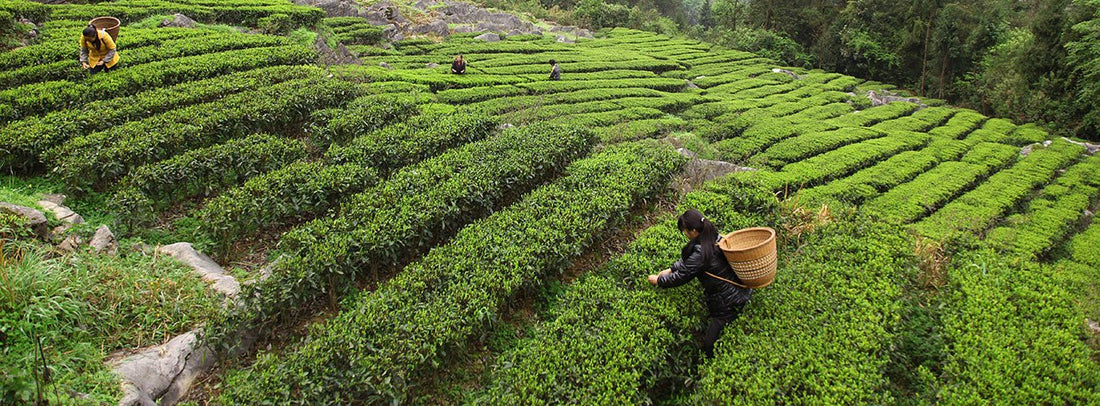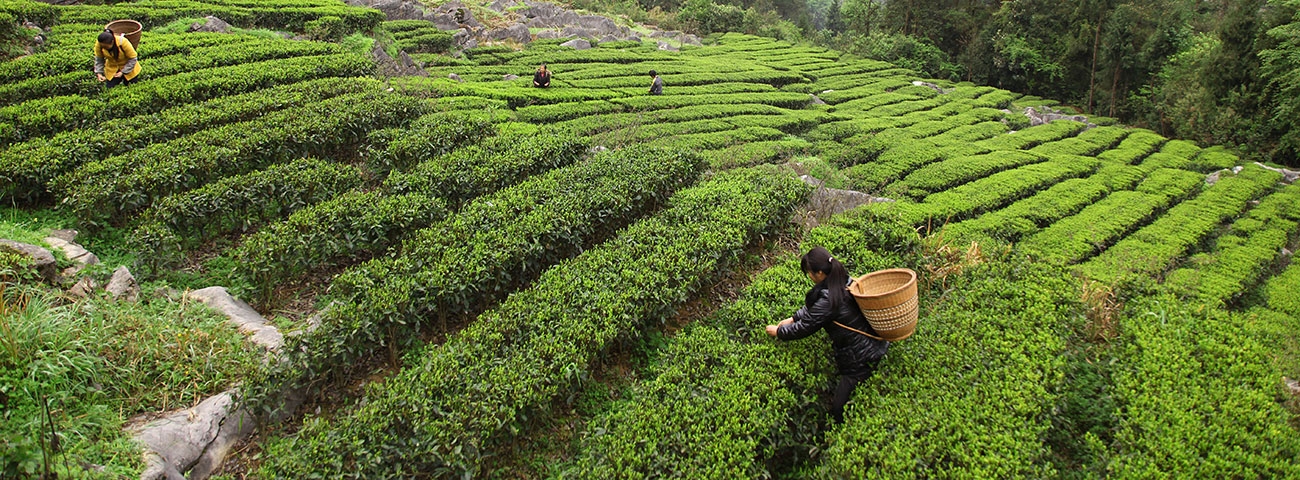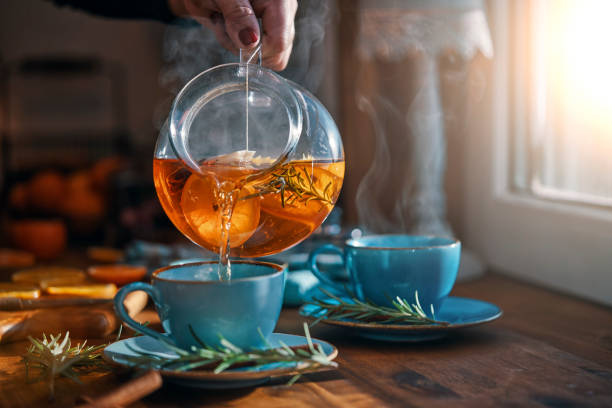
From Leaf to Cup: Discover the Artisanal Journey of Your Favorite Tea Blends
Share
From the first sip of a steaming cup of tea, we're transported to a world rich in history, culture, and craftsmanship. As tea enthusiasts, we often savor the unique flavors and aromas without realizing the incredible journey each leaf undergoes "from leaf to cup." This blog post invites you to explore the artisanal world of tea, where lush plantations and skilled hands transform fresh leaves into the beloved blends we cherish. We'll delve into the cultural significance of tea across the globe and uncover the artistry behind different tea processing techniques that bring out the distinct characteristics of black, green, white, and oolong teas. Join us on this aromatic adventure as we celebrate the vibrant stories and traditions steeped into each cup, and perhaps discover your next favorite brew to enjoy. Learn more about tea culture here.
The Origins of Tea Cultivation
Tea cultivation is an ancient practice that has evolved over centuries. The meticulous care and skill involved in growing tea have led to the creation of diverse flavors and blends cherished worldwide. In this section, we explore how artisan tea cultivation practices, the exploration of distinct tea-growing regions, and sustainable farming methods contribute to the unique journey from leaf to cup.

Artisan Tea Cultivation Practices
Artisan tea cultivation is a craft deeply rooted in tradition. Skilled artisans meticulously tend to each tea plant, ensuring optimal growth conditions. This involves carefully selecting the best varieties and nurturing them through controlled environments. Organic tea cultivation often goes hand-in-hand with artisan practices, emphasizing natural growth processes without synthetic fertilizers.
-
Importance of Climate: The climate greatly influences the flavor profile of tea. Regions with distinct seasons often produce high-quality blends due to the stress placed on the tea plants.
-
Soil Quality: Rich, well-drained soils contribute to the robust flavors of the tea leaves. Plantations often employ sustainable practices to maintain soil health.
Artisan tea cultivation is not just about preserving tradition but also about innovation. By combining age-old techniques with modern sustainability practices, cultivators continue to enhance the richness of their tea offerings.
Exploring Tea Growing Regions
Tea-growing regions around the world each contribute unique characteristics to their teas. From the lush landscapes of Sri Lanka to the high-altitude gardens of Darjeeling, each region's climate and soil composition impact flavor.
-
Sri Lanka (Ceylon): Known for producing some of the finest black teas, Ceylon teas are light and bright, with distinct citrus notes.
-
China: Renowned for its diversity, China offers teas ranging from the robust black to the delicate white and green varieties.
Every region has its own story and tradition that add depth to each brew. Exploring these regions provides insight into the rich tapestry of tea culture and the distinct flavors each one brings to the table.
Importance of Sustainable Tea Farming
Sustainability in tea farming is vital for preserving the environment and ensuring long-term viability. Ethical tea cultivation practices not only support the environment but also benefit local communities.
-
Water Conservation: Implementing techniques to reduce water usage is crucial in tea plantations, given the water-intensive nature of tea cultivation.
-
Organic Practices: By avoiding synthetic pesticides, sustainable farming maintains ecological balance and promotes biodiversity.
Sustainable tea farming is about more than just the environment; it's also about securing the future of tea production. By supporting sustainable practices, we help ensure that the next generation will enjoy this beloved beverage. Discover more about sustainable practices here.
The Art of Tea Processing
The transformation from fresh leaf to a delightful cup involves intricate tea processing techniques. This artistry brings out the unique flavors and aromas of each tea type. Here, we delve into traditional processing methods, the crafting of high-quality blends, and the role of herbs.
Traditional Tea Processing Techniques
Traditional tea processing is a meticulous art that varies for each type of tea. Each process involves specific steps to develop the tea's flavor profile.
-
Withering: Freshly plucked leaves are spread out to reduce moisture content and enhance flavors.
-
Rolling: Leaves are rolled to break cell walls, releasing essential oils that contribute to the tea's aroma.
-
Oxidation: For black teas, leaves are oxidized to deepen flavor and color. This step is carefully controlled to achieve desired results.
Traditional techniques are steeped in history and are crucial for maintaining the authenticity of tea flavors. By understanding these processes, tea enthusiasts can appreciate the complexity and dedication involved in each cup. Learn more about traditional techniques.

Crafting High Quality Tea Blends
Creating high-quality tea blends is an art form that combines various teas and flavors to achieve a harmonious balance. Blenders draw on their knowledge and experience to craft each blend meticulously.
-
Flavor Balance: Achieving the perfect balance between different tea types and flavors is key. Blenders often rely on their palate to guide the blending process.
-
Experimentation: Crafting new blends involves a lot of experimentation. Blenders work with a variety of teas to create unique and innovative flavors.
High-quality tea blends are a testament to the creativity and skill of the blender. Each blend tells a story and offers a new experience for the tea lover.
The Role of Dried and Culinary Herbs
Dried and culinary herbs play a vital role in enhancing the flavor and aroma of tea blends. These herbs can add unexpected dimensions to traditional teas, making them more complex and intriguing.
-
Herbal Additions: Chamomile, peppermint, and lemongrass are popular additions to herbal teas, providing a calming effect and refreshing taste.
-
Culinary Herbs: Culinary herbs like basil and rosemary can add a savory note to certain tea blends, creating a unique experience.
Incorporating herbs into tea blends allows for endless creativity and offers a broad spectrum of flavors. This enhances the tea-drinking experience, making it more enjoyable and personalized.
The Cultural Significance of Tea
Tea holds a significant place in cultures around the world. From ceremonies to daily rituals, tea bridges communities, offering comfort and connection. This section explores the role of tea in global ceremonies, its cultural traditions, and the meaning behind tea gifts.
Tea in Global Ceremonies
Tea ceremonies are integral to many cultures and serve as a symbol of hospitality and respect. Each culture has its unique way of celebrating tea.
-
Japanese Tea Ceremony: Known as "Chanoyu," this is a highly ritualized ceremony focusing on aesthetics and mindfulness.
-
Chinese Tea Ceremony: Emphasizes harmony and includes multiple steeping of tea leaves to appreciate different flavors.
Tea ceremonies are not just about drinking tea. They are about fostering connection and peace, reflecting the cultural significance of tea in bringing people together.
Tea Culture and Its Traditions
Tea culture encapsulates the traditions and customs surrounding tea consumption. Each culture has its own unique practices that add depth to the tea experience.
-
British Afternoon Tea: A social event characterized by the enjoyment of tea with scones and pastries.
-
Moroccan Mint Tea: A symbol of hospitality, served with a flourish to guests as a sign of welcome.
Understanding tea culture allows enthusiasts to appreciate the historical and social contexts of tea. Discover more about tea traditions.
Tea Gifts and Their Meaning
Tea gifts are thoughtful presents symbolizing warmth and friendship. They are perfect for any occasion, offering a personal touch.
-
Tea Samplers: Offer a variety of flavors, allowing recipients to explore different blends.
-
Teaware Gifts: Beautiful teapots or cups can enhance the tea-drinking experience.
Giving tea as a gift is more than just a gesture; it's an invitation to share a moment of tranquility and connection. The symbolic meaning behind tea gifts makes them a cherished way to show appreciation.
Discovering Unique Tea Varieties
The world of tea is vast and diverse, with a multitude of unique varieties waiting to be explored. Each type of tea offers distinct flavors and aromas. In this section, we journey through specialty and herbal blends, explore the spectrum from green to rooibos, and examine the rise of organic and ethical teas.
Exploring Specialty and Herbal Tea Blends
Specialty and herbal tea blends offer an exciting array of flavors and health benefits. These blends often include unique combinations of teas and herbs.
-
Floral Teas: Lavender and rose petals add a fragrant and soothing aspect to the brew.
-
Fruit-infused Teas: Citrus, berry, and tropical fruit flavors create refreshing and invigorating teas.
Herbal blends cater to diverse tastes and preferences, providing relaxation and wellness through their natural ingredients. Explore more about specialty blends.
From Green to Rooibos: A Flavor Journey
Each tea variety offers a distinct taste profile, from the fresh and grassy notes of green tea to the earthy, sweet flavor of rooibos.
-
Green Tea: Rich in antioxidants, it provides a light, fresh flavor with a subtle sweetness.
-
Rooibos Tea: Naturally caffeine-free, it offers a robust, sweet, and slightly nutty flavor.
Exploring different teas is a journey of discovery, revealing the intricate layers of flavor each variety offers. Enthusiasts are encouraged to try new types and find their personal favorites.
The Rise of Organic and Ethical Teas
The demand for organic and ethical teas has surged as consumers become more conscious of their choices. These teas are produced with a focus on environmental and social responsibility.
-
Organic Certification: Ensures the tea is grown without synthetic pesticides or fertilizers.
-
Fair Trade Practices: Support fair wages and safe conditions for tea workers.
Choosing organic and ethical teas aligns with a sustainable lifestyle and supports efforts to protect the planet. Read more about ethical tea production.
Enhancing the Tea Experience
Enhancing the tea experience involves more than just the tea itself. The right teaware and accessories can elevate the enjoyment of each cup. In this section, we explore essential teaware, artisan and handcrafted items, and the art of creating memorable moments with tea gifts.

Essential Teaware and Accessories
Having the right teaware and accessories is crucial for preparing and enjoying tea to its fullest potential. These items ensure the proper brewing process and enhance the overall experience.
-
Tea Infusers: Allow for the proper steeping of loose leaf tea, ensuring full flavor extraction.
-
Ceramic Mugs: Retain heat well, keeping your tea warm for longer.
Investing in quality teaware can transform the simple act of drinking tea into a ritual, adding a sense of occasion to everyday moments.
Artisan Teaware and Handcrafted Items
Artisan teaware and handcrafted items add a unique touch to the tea experience. These pieces are often crafted with care and attention to detail, reflecting the artistry of their makers.
-
Handmade Teapots: Each teapot is a work of art, designed to enhance the presentation and enjoyment of tea.
-
Pottery Teaware: Offers a rustic and authentic feel to the tea service.
Using artisan teaware connects the drinker to the craftsmanship and tradition of tea, making each sip more meaningful. Learn more about artisan teaware.
Creating Moments with Tea Gifts
Tea gifts are a wonderful way to create special moments and memories with loved ones. They offer a personal and thoughtful gesture that can be enjoyed together.
-
Tea Gift Baskets: Include a selection of teas, teaware, and accessories for a complete experience.
-
Personalized Tea Kits: Allow for customization, adding a personal touch to the gift.
Gifting tea is about sharing joy and connection, celebrating the simple pleasure of a good cup of tea with those who matter most.
